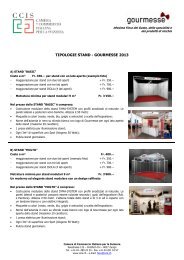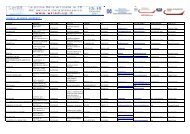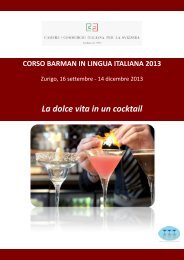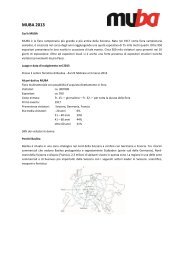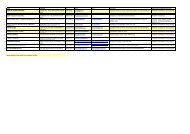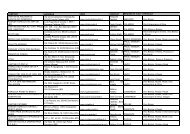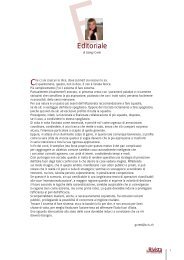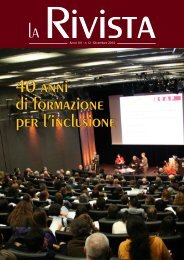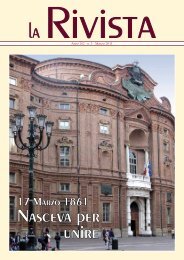ANGOLO LEGALE<strong>di</strong> Massimo CalderanIl contratto <strong>di</strong> garanziain Svizzera (2 a parte)Nell’ultimo numero del<strong>la</strong> Rivista abbiamo trattato il temadei contratti <strong>di</strong> garanzia in Svizzera, dando conto del<strong>la</strong>loro enorme importanza e <strong>di</strong>ffusione nei rapporti economici.Al fi ne <strong>di</strong> comprenderne <strong>la</strong> portata abbiamo sostanzialmentespiegato che il legame che unisce il contrattoprincipale e <strong>la</strong> prestazione <strong>di</strong> garanzia nel<strong>la</strong> fi deiussionenon è riscontrabile nel Garantievertrag, nel contratto <strong>di</strong>garanzia, comportando ciò delle conseguenze rilevantidal punto <strong>di</strong> vista non solo del<strong>la</strong> <strong>di</strong>sciplina ma anche deglistrumenti <strong>di</strong> tute<strong>la</strong> <strong>di</strong> cui il garante <strong>di</strong>spone. In sostanzaè <strong>di</strong>versa <strong>la</strong> <strong>di</strong>namica nel suo insieme ed è più forte l’interessepersonale (o economico) che il garante ha nelfornire tale garanzia.Come detto nel<strong>la</strong> prima parte i contratti <strong>di</strong> garanzia sonomolto <strong>di</strong>ffusi nell’ambito del commercio internazionale,ed anche in Svizzera, sotto forma <strong>di</strong> garanzie prestateme<strong>di</strong>ante le banche. In Svizzera si par<strong>la</strong> da un <strong>la</strong>to <strong>di</strong> Bankgarantiee dall’altro <strong>di</strong> Letter of Cre<strong>di</strong>t.Qual è concretamente il contenuto <strong>di</strong> tali forme <strong>di</strong> interventobancario? Un esempio tipico è dato dal<strong>la</strong> bancache garantisce <strong>di</strong> pagare una somma x ad una <strong>di</strong>tta beneficiaria del<strong>la</strong> garanzia a seguito dell’inadempimento <strong>di</strong>una <strong>di</strong>tta terza (cliente del<strong>la</strong> banca), in riferimento ad uncontratto <strong>di</strong> fornitura. In altri casi <strong>la</strong> banca garantisce chepresterà <strong>la</strong> somma x quale restituzione <strong>di</strong> un acconto incaso <strong>di</strong> inadempimento del cliente del<strong>la</strong> banca. Si tratta <strong>di</strong>un servizio che ovviamente ha un costo, spesso elevato.Tenendo presente che non è richiesta alcuna formalitàper il contratto <strong>di</strong> garanzia, contratti <strong>di</strong> questo tipo sononormalmente redatti per iscritto, viene tipicamente in<strong>di</strong>catoil contratto cui <strong>la</strong> garanzia si riferisce, viene in<strong>di</strong>cata<strong>la</strong> durata e ci si impegna in modo irrevocabile a pagare,subito, a prima richiesta, in<strong>di</strong>pendentemente dal<strong>la</strong> vali<strong>di</strong>tàe dagli effetti giuri<strong>di</strong>ci del contratto <strong>di</strong> riferimento, rinunciandoa far valere ogni eccezione e obiezione risultantedal contratto medesimo. Spesso viene tuttavia inseritauna c<strong>la</strong>uso<strong>la</strong> che richiede <strong>la</strong> presentazione <strong>di</strong> una precisadocumentazione al fi ne <strong>di</strong> escutere il pagamento del<strong>la</strong>somma garantita, soprattutto qualora sia coinvolta unabanca, tale c<strong>la</strong>uso<strong>la</strong> può evidentemente svolgere un ruolo<strong>di</strong> grande rilievo. Questo è <strong>la</strong> cosiddetta Bankgarantie.Esistono <strong>di</strong>verse tipologie, che vengono poi model<strong>la</strong>te inriferimento al contratto richiamato.Nonostante quanto appena detto, ciò non signifi ca chenon esista una via per sottrarsi all’obbligo <strong>di</strong> pagarequanto escusso a “prima richiesta” e senza obiezioni, soprattuttonel caso in cui ciò sia palesemente ingiusto. In<strong>di</strong>versi casi i giu<strong>di</strong>ci hanno riconosciuto che l’escussioneera fraudolenta e contro buona fede, ricorrendo un’ipotesiin tal caso <strong>di</strong> responsabilità per condotta contro buonafede. In un altro caso il contratto era stato consideratonullo in quanto mirava ad assicurare un risultato contrarioalle norme <strong>di</strong> or<strong>di</strong>ne pubblico e al buon costume, talegrave invali<strong>di</strong>tà del contratto faceva sì che non si potessepretendere l’escussione del<strong>la</strong> garanzia. In altri casi si èregistrata <strong>la</strong> tendenza a far rientrare, con interpretazionitalora forzate, i casi nell’ipotesi <strong>di</strong> fi deiussione e non <strong>di</strong>garanzia, al fi ne <strong>di</strong> ottenere un maggior livello <strong>di</strong> tute<strong>la</strong>.La Letter of Cre<strong>di</strong>t con<strong>di</strong>vide con <strong>la</strong> Bankgarantie alcunecaratteristiche essenziali come il rilievo sul piano commerciale,l’astrattezza e l’in<strong>di</strong>pendenza dal contratto chesta al<strong>la</strong> base dello scambio commerciale. Svolge <strong>la</strong> suafunzione principale nei rapporti <strong>di</strong> import-export e rientranel<strong>la</strong> categoria giuri<strong>di</strong>ca del mandato. La banca agisceper conto del cliente ed é incaricata <strong>di</strong> mettere a <strong>di</strong>sposizione<strong>di</strong> un terzo una somma determinata. Il terzo o <strong>la</strong>banca incaricata può accedere a questa somma <strong>di</strong>etropresentazione del<strong>la</strong> documentazione <strong>di</strong> trasporto dellemerci, comprovante l’avvenuta consegna. All’atto del<strong>la</strong>presentazione del<strong>la</strong> documentazione richiesta <strong>la</strong> bancadeve liberare <strong>la</strong> somma posta a cre<strong>di</strong>to in favore del terzo.In tal modo una parte ha <strong>la</strong> sicurezza che il pagamentoavverrà solo <strong>di</strong>etro presentazione dei documenti stabiliti,l’altra parte avrà <strong>la</strong> certezza <strong>di</strong> ottenere rapidamente ilpagamento che le è dovuto. Tale meccanismo agevo<strong>la</strong> <strong>di</strong>molto lo scambio negli affari garantendo rapi<strong>di</strong>tà e sicurezzaallo stesso tempo.Una nota partico<strong>la</strong>re va data al<strong>la</strong> Standby Letter of Cre<strong>di</strong>tche si presenta nel<strong>la</strong> forma del<strong>la</strong> Letter of Cre<strong>di</strong>t, ma ha<strong>la</strong> natura <strong>di</strong> un contratto <strong>di</strong> garanzia prestato dal<strong>la</strong> banca,nell’ambito <strong>di</strong> un rapporto <strong>di</strong> import-export. Sul<strong>la</strong> base delcontratto, verrà pagata, <strong>di</strong>etro presentazione <strong>di</strong> precisadocumentazione, una somma a titolo <strong>di</strong> indennizzo incaso <strong>di</strong> mancata esecuzione del<strong>la</strong> consegna del<strong>la</strong> merceo <strong>di</strong> esecuzione dei servizi. Tale forma è nata negli USA,dove un tempo <strong>la</strong> normativa vietava alle banche statunitensi<strong>di</strong> assumere garanzia <strong>di</strong>rettamente nei confronti <strong>di</strong>un terzo.calderan@altenburger.ch<strong>la</strong> Rivistan. 7/8 - Luglio/Agosto 201041
CONVENZIONIINTERNAZIONALI<strong>di</strong> Paolo ComuzziL’OCSE stu<strong>di</strong>a mo<strong>di</strong>fi cheal commentario con riferimentoall’articolo 15 del Modello <strong>di</strong> convenzioneÈ in fase <strong>di</strong> stu<strong>di</strong>o presso <strong>la</strong> organizzazione OCSE unostu<strong>di</strong>o per <strong>la</strong> revisione del modello <strong>di</strong> convenzione conriferimento all’articolo 15 del modello stesso ed in partico<strong>la</strong>reviene integrato il commentario che è quello strumentoche consente <strong>di</strong> ad<strong>di</strong>venire ad una interpretazione,<strong>di</strong>ciamo così, con<strong>di</strong>visa del<strong>la</strong> convenzione stessa.La organizzazione OCSE ammette che: “ … Paragraph 1[dell’articolo 15 citato] establishes the general rule as tothe taxation of income from employment (other than pensions),namely, that such income is taxable in the Statewhere the employment is actually exercised. The issue ofwhether or not services are provided in the exercise ofan employment may sometimes give rise to <strong>di</strong>ffi cultieswhich are <strong>di</strong>scussed in paragraphs 8.1 ff. Employment isexercised in the p<strong>la</strong>ce where the employee is physicallypresent when performing the activities for which the employmentincome is paid. One consequence of this wouldbe that a resident of a contracting State who derived remuneration,in respect of an employment, from sourcesin the other State could not be taxed in that other State inrespect of that remuneration merely because the resultsof this work were exploited in that other State …”.Di fatto si afferma che l’attività <strong>di</strong> <strong>la</strong>voro viene svolta nelluogo in cui fi sicamente <strong>la</strong> stessa viene prestata ma intaluni casi può essere complesso determinare proprioquesto luogo.In aggiunta non possiamo ignorare che “ …It may be <strong>di</strong>fficult, in certain cases, to determine whether the servicesrendered in a State by an in<strong>di</strong>vidual resident of anotherState, and provided to an enterprise of the fi rst State(or that has a permanent establishment in that State),constitute employment services, to which Article 15 applies,or services rendered by a separate enterprise, towhich Article 7 applies or, more generally, whether theexception applies. While the Commentary previously dealtwith cases where arrangements were structured for themain purpose of obtaining the benefi ts of the exceptionof paragraph 2 of Article 15, it was found that simi<strong>la</strong>rissues could arise in many other cases that <strong>di</strong>d not involvetax-motivated transactions and the Commentary wasamended to provide a more comprehensive <strong>di</strong>scussionof these questions. In some States, a formal contractualre<strong>la</strong>tionship would not be questioned for tax purposes unlessthere were some evidence of manipu<strong>la</strong>tion and theseStates, as a matter of domestic <strong>la</strong>w, would consider thatemployment services are only rendered where there is aformal employment re<strong>la</strong>tionship …”In alcuni casi è complesso determinare se ci troviamo <strong>di</strong>fronte ad una situazione per cui abbiamo un impiego e /o abbiamo servizi resi da un’impresa estera con <strong>la</strong> conseguenzache nessuna tassazione sarebbe da applicare inassenza <strong>di</strong> una stabile organizzazione.CommentiLa normativa Italiana in materia <strong>di</strong> <strong>la</strong>voro <strong>di</strong>pendente (normativainterna) è chiara nell’affermare che si consideranoprodotti in Italia i red<strong>di</strong>ti <strong>di</strong> <strong>la</strong>voro <strong>di</strong>pendente nascenti da<strong>la</strong>voro “… prestato nel territorio dello Stato …”.A questo punto il meccanismo è chiaro che:• Il soggetto residente paga su questo red<strong>di</strong>to in quantoresidente (principio <strong>di</strong> tassazione sul red<strong>di</strong>to globale)e usa del cre<strong>di</strong>to per imposte assolte all’estero se haassolto imposte;• Il soggetto non residente paga imposte su questo red<strong>di</strong>toquando presta <strong>la</strong> sua opera nel territorio dello Stato(cosa questa che <strong>la</strong>scia intendere un concetto fi sico<strong>di</strong> prestazione ovvero che <strong>la</strong>scia intendere che <strong>la</strong> suaattività deve svolgersi sotto <strong>la</strong> <strong>di</strong>rezione <strong>di</strong> un impren<strong>di</strong>toreitaliano ma questa interpretazione non è univoca inquanto <strong>la</strong> dottrina par<strong>la</strong> anche <strong>di</strong> “localizzazione in Italiadel<strong>la</strong> attività svolta”).Su questo elemento (localizzazione in Italia del<strong>la</strong> attivitàsvolta) si concentra appunto <strong>la</strong> mo<strong>di</strong>fi ca del commentarioOCSE che prende in considerazione proprio questa problematica.Il commentario sembra volere legare <strong>la</strong> norma <strong>di</strong> cui all’articolo15 con quel<strong>la</strong> prevista nell’articolo 7 (tassazionedelle imprese) e quin<strong>di</strong> sembra voler <strong>di</strong>re che in assenza<strong>di</strong> una stabile organizzazione del<strong>la</strong> impresa anche i <strong>di</strong>pendenti,seppur inviati in Italia, non dovrebbero scontareimposta.Questo sembra potersi intendere quando lo stesso affermache “ …Article 7 is based on the principle that anenterprise of a Contracting State should not be subjected42<strong>la</strong> Rivistan. 7/8 - Luglio/Agosto 2010




